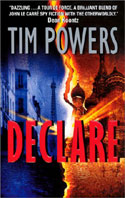
What about with Declare? What struck me, because I was reading your book just after having watched a James Bond movie, and I’m thinking, “Wow, this is nothing like James Bond.” But I have a sense that it was much more real, and that’s the sort of thing that probably does go on, because you don’t walk into a bar and say, “Shaken not stirred.” You’ve got to go unnoticed. You might have somebody writing a message for you in steam on a window backwards. What was the process for that book?
Well, that one, it started because I read a book about Kim Philby. And I was just reading it for entertainment, because it had an introduction by John LeCarre, and I like LeCarre.
And he was a British double agent?
Yes, Philby was the head of counterespionage for the British Secret Service. But then it turned out very late that he had, in fact, been working for the Russians since, like, I don’t know, since the age of 20, practically. In fact, there’s speculation that his father might have been working for the Russians, too. In fact, I don’t think that’s true. But there was speculation that way. And so I read this book just for entertainment, but got this familiar sensation that, you know, you could base a book on this. There’s some weird stuff going on here, or things that could be argued to be weird stuff.
I found that he was inordinately interested in Mt. Ararat. He was head of station in Turkey for the Secret Service. But he was always going out and looking at Mt. Ararat. And I think, “OK, well, probably that’s because Ararat happens to be at the border with the Soviet Union and it’s kind of a crucial point, geographically.” But it was Mt. Ararat, which is, of course, where [Noah’s] ark is supposed to have landed. And I thought, “Well, keep that in mind.”
And then he was weirdly interested in the Catholic Church. He had a sort of resentful fascination with it. And his father made very sure not to ever have Philby baptized, but they went together to the River Jordan and took samples of the water and sent it to the British Museum for testing, to see if it had supernatural properties.
I didn’t know you could test for that.
Well, I know. I can’t imagine what tests he thought they would run, you know, splash it on dead mice and see if they come back to life? I wound up thinking, “OK, there’s enough here for a story. This is weird.”
And both Philby and his father were very involved in the Middle East, in Arabia. In fact, his father was instrumental in Arabia being called Saudi Arabia. He was on the side of King Saud. And so I read up on that. And I thought, well, I always like to use the intrinsic mythology of the area, so I read thoroughly Burton’s translation of 1001 Nights. So I got genies and all the associated Arab folklore.
And so I said, “OK, cook up a secret explanation for the Cold War, based on Catholicism, since Philby had such an obsession with it, and Arab folklore.” And luckily, the whole spy set-up, the whole spy world, with the British Secret Service and Soviet Secret Service, the way the Soviet Secret Service every couple of years would purge everybody, kill all their personnel […] even the janitors. Every few years, they’d just say, “You know what? Let’s be on the safe side. Kill all of them.”
[…] So I read very extensively on the whole Secret Service, spy world. And in fact, our hero’s period as a spy in Paris, a Soviet undercover spy in Nazi-occupied Paris, was based on a book. I think it was called I Was a Soviet Spy by a guy named Foote, as I recall. And so I did have a lot of fun making it hew as closely as I could to real spy behavior. All the business about the radios and the signals, that was all real fun, because I was sort of saying, yes, it’s exactly the way the history books say, but there was this secret stuff going on under the surface which the history books don’t convey.

